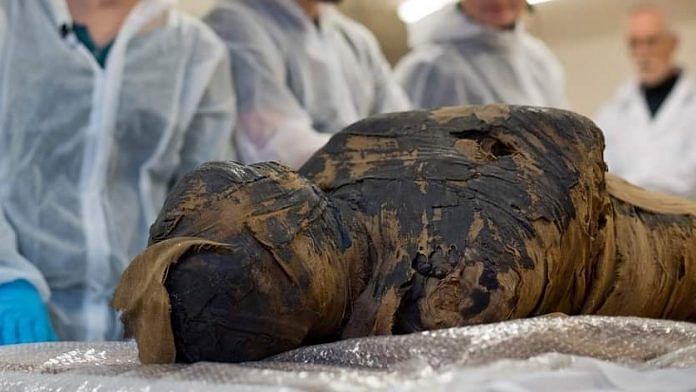
New Delhi: Researchers have found that an Egyptian mummy, which was previously believed to be a priest, was actually a pregnant woman who lived in the 1st century BCE. The scientists revealed that this occurrence is the first known case of its kind.
The discovery was made by scientists in Poland who were conducting a study on more than 40 mummies at the National Museum in Warsaw. The findings of this study were published in The Journal of Archaeological Science on 28 April. The team has been working since 2015 on the Warsaw Mummy Project.
“It (the findings) was absolutely unexpected,” said Wojciech Ejsmond, archaeologist who led the research and director of the Warsaw Mummy Project, according to a report in The New York Times.
He added: “Our anthropologist was double-checking the pelvis area of the mummy to establish the sex of the mummy and check everything, and she observed something weird in the pelvis area, some kind of anomaly.”
The ‘anomaly’ was found to be a small leg of a foetus. The findings revealed that the foetus was 26 to 30 weeks old at the time. X-rays also suggested that the woman died when she was 20 to 30 years old.
“This find is the only known case of an embalmed pregnant individual,” the study said.
She was from an ‘elite’ family
In its report, The New York Times noted that burials of pregnant women in Egypt have been recorded before, but this was the first time a mummified pregnant woman was discovered.
“It’s like finding a treasure trove while you are picking up mushrooms in a forest,” Dr Ejsmond said.
The mummy was first found at Thebes in Egypt and dates back to the 1st century BCE. The study revealed that the woman came from an ‘elite’ family in the Theban community. Her body was ‘carefully’ mummified and wrapped in fabrics and rich amulets.
The researchers have stated in the study that this finding has ‘opened up new possibilities’ of researching pregnancy and maternal practices in ancient times. “This specimen sheds a light on an unresearched aspect of ancient Egyptian burial customs and interpretations of pregnancy in the context of ancient Egyptian religion,” the study said.
Subscribe to our channels on YouTube & Telegram
Why news media is in crisis & How you can fix it
India needs free, fair, non-hyphenated and questioning journalism even more as it faces multiple crises.
But the news media is in a crisis of its own. There have been brutal layoffs and pay-cuts. The best of journalism is shrinking, yielding to crude prime-time spectacle.
ThePrint has the finest young reporters, columnists and editors working for it. Sustaining journalism of this quality needs smart and thinking people like you to pay for it. Whether you live in India or overseas, you can do it here.